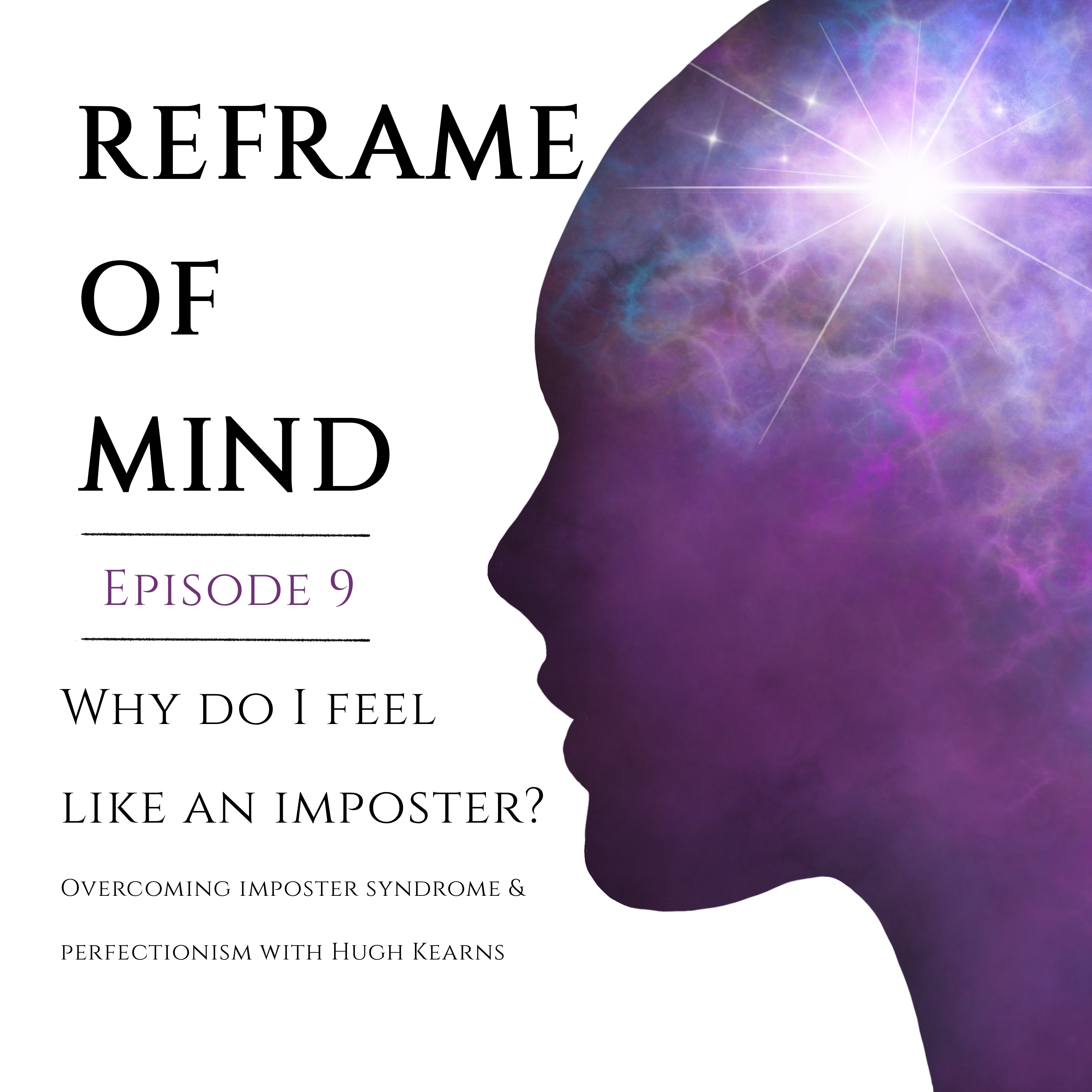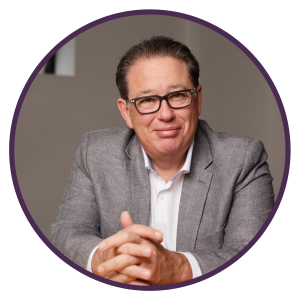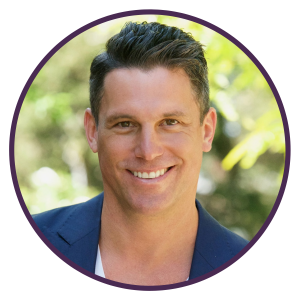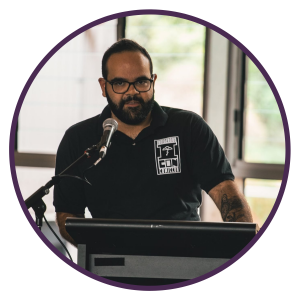Episode 9: Why do I feel like an Imposter?
Overcoming Imposter Syndrome & Perfectionism with Hugh Kearns


So you’ve got that promotion. Congratulations!
How long is it before that knot in your stomach starts to tighten, the lump in your throat starts to grow and you start to feel like you’re out of your depth?
Imposter syndrome isn’t just a workplace phenomenon. There are all kinds of ways we can hold ourselves back from completing things.
Maybe you’re a self proclaimed perfectionist? Or gold-standard procrastinator?
These traits are all too common companions in the imposter cycle, which we explore with Mr Hugh Kearns, lecturer and researcher in the area of high performance at Flinders University.
You can connect with Reframe of Mind on our social media directly below:
Jump to: Episode Transcript | Show Notes | Other Guests | Gallery
Follow us now on your podcast app!
Reframe of Mind contains discussion around mental health that may be disturbing to some listeners. If you are concerned about yourself or someone you know, please seek professional individual advice.
Some of the main crisis lines in Australia are listed on our Mental Health Crisis Resources page, including those that operate 24/7 like Beyond Blue and Lifeline.
Guests this episode:

Hugh Kearns
Researcher & Educator, Flinders University Founder iThinkwell

Suzanne Mercier
Imposter Syndrome Expert, Founder Purpose to Profit
Gallery
Jump to: Episode Transcript | Show Notes | Other Guests | Top of Page
Show Notes:
Here’s some extra things you might not know about Hugh and Suzanne, as well as some of the things mentioned during the episode.
Hugh
Free planners and guides from Hugh’s website ThinkWell
Hugh’s research papers on behaviour
Hugh’s Flinders University profile
Connect with Hugh on Twitter
Watch a keynote speech from Hugh Kearns on Imposter Syndrome here:
Suzanne’s Purpose to Profit website.
Read Suzanne’s book: Liberate Leadership.
Watch Suzanne talk about Imposter Syndrome on her Youtube channel:
Read the original research paper from 1978 that we discussed in Reframe of Mind:
Jump to: Episode Transcript | Other Guests | Gallery | Top of Page
Transcript
Louise 0:00
We acknowledge the Yuggera and Kaurna nations as traditional custodians of the land on which we work, live and learn, and they continue in connection with the land waters and community we pay our respects to them and their elders past and present.
Andy 0:12
All content related to this programme is for general informational purposes only and contain stories and discussion around mental health that may be disturbing to some listeners. If you’re concerned about yourself or someone you know, please seek professional and individual advice and support. More details are contained in our show notes.
Manager 0:31
Thanks for your attention today everyone it’s been a great meeting. One more thing before we go I just want you to join me in congratulating Imposter for taking out the annual Employee Innovation Challenge and as you know the prize is a promotion into the leadership team well done imposter
Imposter 0:49
Thanks.
Manager 0:50
Time to get back to the floor everyone. Imposter, can you say back a minute for me please?
Imposter 0:55
Yeah, yep.
Devil 0:59
Get ready for it. This is the bit where he says your only temporary time leader.
Imposter 1:04
What, wait, who are you?
Devil 1:06
I’m that little voice that gives you a reality check. Devil’s Advocate. Devil for short.
Imposter 1:14
Yeah, well, you’re probably right. It’s not like like my idea was really all that original.
Perfection 1:19
You’re dead right there sister! Imagine if you’d spent some actual time on it.
Imposter 1:23
Hang on, who are you?
Perfection 1:24
Your inner crap detector, When nothing short of perfect will do. And I don’t need to tell you that that was far from perfect.
Andy 1:34
Awesome job imposter. How does it feel to reap the rewards of your hard work?
Perfection 1:39
Hard work? Ha!
Devil 1:41
You know, you’re just a quota, right? The boys club just found a lady friend!
Imposter 1:46
Um… good. I think
Andy 1:48
Still a bit surprised, I can see.
Imposter 1:50
Yes.
Devil 1:51
That’s not only he’s gonna see when he bothers to look properly
Andy 1:55
where did you come up with your idea?
Devil 1:57
Here we go! He can see fraud written all over your face?
Louise 2:01
Well, I just kind of compared our performance stats over the last 12 months and looked at the impact of things like camera use in zoom meetings and activities in team meetings, that let people connect with each other for a little while without a focus on the business.
Perfection 2:13
Oh my god! How much more general can you get? And talk too much about time wasting on subjects not related to the job
Manager 2:22
Well, it’s paid off
Devil 2:23
He’s lying!
Manager 2:25
Some of the other leaders have been trying what you did, and have had some amazing results with their teams.
Perfection 2:30
I’ll bet they did better! What experience have you actually got?
Imposter 2:33
Great!
Manager 2:34
So the first thing I’m going to get you to do is to write a job ad so you can backfill the position you’re leaving,
Perfection 2:40
You’ll never be able to do that properly.
Devil 2:42
And whoever you hire’s probably gonna be way better at your job than you are!
Perfection 2:46
That wouldn’t be hard.
Devil 2:48
Your teammates already think they’re better for the job.
Louise 2:51
Guys, can you just please up a minute? Ahem. Would it be better to get one of the experienced guys to take the lead on that?
Andy 2:58
No, no. It’s a really good way of acknowledging just how much you’ve been doing and focusing in on the right qualities to look for when you’re hiring
Devil 3:05
And showing him exactly what an imposter you actually are!
Louise 3:10
Okay. Ah, yep, I will put something together and run it by you
Manager 3:13
No need. I trust you. Just send it to HR when it’s ready.
Perfection 3:18
This is gonna take some work if HR are involved.
Imposter 3:21
Okay, thanks.
Andy 3:23
Hey!
Imposter 3:23
(GASP along with Devil and Perfection)
Manager 3:24
Congratulations again. It’s really great to see someone rewarded for the excellent work they do. You’ll get a confirmation letter from HR about your promotion in the next couple of days.
Devil 3:34
Don’t hold your breath!
Louise 3:36
Well, those voices were a bit too easy to conjure up weren’t they.
Andy 3:41
Yeah, that’s our internal monologues. And this is Reframe Of Mind.
Louise 3:47
The podcast that cuts through the platitudes and gets to the core of living authentically challenging our assumptions and improving mental health with the guidance of good science, philosophy, and learning from other people’s lived experiences.
Andy 3:58
And we’re your hosts Andy Le Roy and Louise Poole.
Louise 4:01
We started our mental health adventure in episode one of Reframe Of Mind when we were both at what you’d call the emotionally pointy end of some life events.
Andy 4:10
Yeah, your radio career of 26 years had ended and like any good breakup from a long term relationship, there were lots of feelings both residual and deeply rooted,
Louise 4:20
and you’d not long lost your elderly father to cancer and were dealing with the associated grief and inevitable changes in family dynamics.
Andy 4:27
Then we decided to make a podcasting business and realised all of those feelings that appeared from day to day manifest with other masks in different parts of our lives and in work and business.
Louise 4:38
Yep, that feeling of not being good enough certainly bought along an old friend, imposter syndrome. Know it Well?
Andy 4:47
Mm-hmm!
Louise 4:47
Most people do unless you’re one of the lucky 30% of the population that haven’t experienced it, you have experienced it at some point in your career.
Andy 4:54
Oh yeah, and last time on Reframe Of Mind we met imposter syndrome expert Suzanne Mercier, who very nicely summed up what imposter syndrome is.
Suzanne Mercier 5:02
It’s a persistent belief that we’re not good enough. So some people feel that, that experience of not good enough when they are in a different area, they’re doing a new job or something like that. So they’re outside their comfort zone. But when they get used to the new job, then they’ve just expanded their comfort zone and they get to feel quite comfortable. Somebody who experiences the imposter syndrome feels that they just can’t see why they’ve been given the opportunity or they’re they’re just not able to internalise their success. So they remain uncomfortable. And so it’s a persistent belief that they’re not good enough. It’s not there all the time. It’s latent until something that causes them to feel uncertain occurs, and then they react and then, well they’re triggered into feeling that they’re not good enough. So it’s something that they can be quite comfortable and quite confident, one minute and then something happens in their external environment, and they’re suddenly feeling that they’re not good enough and all the awful bits that go with that which I’ve certainly experienced myself.
Louise 5:54
Yes, imposter syndrome. It’s pretty friendly with its counterparts as well, perfectionism and procrastination. And we’re going to have a chat a little bit later on with Mr. Hugh Kearns from the College of Medicine and Public Health at Flinders University, about our experiences here,
Andy 6:08
we might even have a new podcast to get you excited about,
Louise 6:11
but our imposter syndrome journey isn’t over quite yet. Andy, when’s the first time you noticed imposter syndrome manifest for you?
Andy 6:18
Pretty much any time that I’ve been appointed to a leadership role, I’ve got to be honest. You know, you go through the interviews, you’re confident and you want the job, and then you get it. And then the little voice inside your head says “Yeah, but you were saying all the things they want to do to say, you knew what they wanted you to say, You just said it and you got the job, and now you’ve got to prove yourself.”
Louise 6:38
That voice sounds a lot like the devil from the skit up the top.
Andy 6:42
(in Devil’s voice) Yeah don’t hold your breath, mate, you’re not gonna succeed. (Regular voice) So, I don’t know, then there’s the the two camps. So the two theories. So you go, Okay, I’ve got this job, I’ve now been elevated to the leader of the team that I was in. So people are going to challenge me and people say, “Yeah, that’s really hard. Because you know, you have to take on a different role.” Now you actually got a different relationship to the team. So you know, people are going to challenge you. And of course, you’re gonna feel like an imposter and feel like you don’t know everything, but can I tell you something? I’ve experienced that. And I’ve also experienced walking in as a fresh manager into a new workplace and had exactly the same feelings because guess what, you’ve got people that who have been there for some years, and they know everything, too. It’s like this little friend that goes wherever you decide to take it, wherever you decide to go. And it just doesn’t leave you alone, always tapping you on the shoulder. “Hey, what about that? No, youdon’t know that. What would you know?” In fact, you know, it manifested in my last job in a team meeting with other managers. We were tossing around ideas. I thought, Okay, well, I’ve been hired for the job. They want my opinion. And so I gave my opinion. And one of the other leaders said, Well, no offence, but what would you know?
Louise 7:51
Oh, they said that?
Andy 7:52
They actually said that.
Louise 7:53
So that wasn’t the voice in your head?
Andy 7:55
So that little voice did decide this time to externalise itself into the mouth of an alpha douche.
Louise 8:00
Ah, well, nothing like a someone saying that they don’t think you’re good enough to help back up those feelings that are inside your head is there?
Andy 8:07
Too right!
Louise 8:09
Also, what an awful colleague. I reckon the first time I noticed imposter syndrome was I mean, I’ve been managing teams since I was quite young, I think the first time I was ever put in charge of a group of people, I was 21 or 22. And at that time, I had a lot of people who were older than me and I have in all the management jobs that I’ve had, obviously, when you’re young, and you’ve got people of all different ages and experiences, you’re in charge of the imposter definitely creeps in and says, “Hey, these people have more experience than you. What do you know? Why are you in charge? Someone must have made a mistake” or “You’ve fooled them, oh, boy, one day, they’re going to work out that you actually don’t know what you’re doing.” Yeah. So that’s really been a thing for me to be conscious of. At first, I didn’t know that anybody else felt that way. I thought it was all me. It was unique to me, all about me. Because I’m the one that’s the fraud and everybody else, even the other people who are also my age, they know what they’re doing. They have more skills, or they’ve learned stuff or, you know, whatever it might be. It wasn’t until I started speaking to other managers about it, that I realised I wasn’t the only one. And that’s hard to because first, you’ve got to have another person in a management position that you actually trust enough to say, “Listen, I feel a bit like a fraud.” And that’s hard to find. Because people don’t really talk about it. Well, they do now, I suppose the imposter syndrome is becoming more prevalent in conversation,
Andy 9:38
Kind of because the conversation kind of goes “ah, you know, I just some days, I just feel like a fraud.” And then the other person typically goes “yeah, yeah, me too. That’s kind of normal. Anyway, let’s go for coffee.” Yeah. So there’s this is basic acknowledgement. Yep, that is there. But there’s never really cut any deep exploration beyond that. It’s like oh, well, that’s just that’s just our mental health playing up on us. Playing tricks on us.
Louise 10:02
Ah we’re all just frauds hoping we figure it out.
Andy 10:05
We just need to carry on and pretend that it’s not happening because you know, it’s, it’s not real. Also, you know, and feel free to edit this out as well. But I do think a lot of these thoughts that cross our mind as well do come from some source that kind of validates them insofar as when you’re in a team, and you’ve got a manager and you’re not the manager, there is this Us and Them thing. And so when we actually do succeed and become the leader, or the manager, suddenly we know what everybody else has been saying about the last one. Why wouldn’t they be saying about us? And why wouldn’t it be true, because that’s what we felt about the last one ourselves. So there’s kind of this toxic little loop that goes on. But also outside of that it can be completely unrelated to a team, it can be something if you are trying a new skill could even be you if you’re meeting a new group for the first time.
Louise 11:04
Yeah, I don’t think imposter syndrome has to refer to a work situation.
Andy 11:08
No, I don’t think so either
Louise 11:09
It can refer to any of these situations where we feel like a fraud, and we’re gonna be found out
Andy 11:14
think about public speaking.
Louise 11:15
Oh, yes. Well, I think about that every time I’m on a zoom call, I think I think. And, you know, as what we said earlier up, I’ve done 26 years of public speaking, but get me on a zoom call. And I’m like, what if they realise that I don’t know how to communicate?
Andy 11:32
Yeah, because they can see you up close
Louise 11:32
Because can see what because they can see me!
Andy 11:36
they can see your nostrils flaring. And they don’t realise that you’re just hot,
Louise 11:40
what if they rea;;y… What if I’ve got nothing to say? I’ve hosted things before, you know, in front of audiences, or MC, whatever it might be, and I’ve had great feedback from it. They’re going, “Oh, you’ve done a great job.” And I’m there the whole time going “What if I run out of things to say, what if I’ve got nothing to say? I mean, I don’t actually know what I’m doing. I don’t know how to host this thing. You’ve just given me a piece of paper with some talking points on it. And I’m just reading them and then just kind of words are flying out of my mouth, but I don’t really know what I’m doing.”
Andy 12:11
And then when everybody says, what a great job you did do sometimes go “yeah but were they’re really listening? Oh they were all just drunk, they were just clapping in the pauses.”
Louise 12:19
They were just there for Delta Goodrem. Not me. THey didn’t care.
Andy 12:22
Louise who?
Louise 12:25
Who’s that woman with a piece of paper flapping around next to Delta Goodrem asking questions. That was me. That was me. And I didn’t know what I was doing. But I guess it looked like I did. So either that or Delta was very polite and thinking, Who is this?
Andy 12:40
I’m sure she’s very polite. I’m pretty sure that wasn’t why she was polite.
Louise 12:45
So yeah, imposter syndrome. I think it can manifest everywhere. And Suzanne, who we spoke to last episode, she regularly works with people to find their purpose and use as a checklist to help people identify whether they have potentially experienced that imposter syndrome or not,
Suzanne Mercier 13:00
We tend to take things quite personally as well. And I say “we” because I was probably the biggest, one of the biggest sufferers of the imposter syndrome, I have a 10 question checklist that I give people for when we’re talking about the imposter syndrome, and I say anything over three, and you’ve experienced it at some stage, and I get up around the nine. I did originally. so I remember talking at a conference and this woman saying, Oh, I got 10 out of 10! I got 10 out of 10! And she was so excited. And I said “well at least you’re in the right place!”
Andy 13:30
So the old checklist, who doesn’t love a quiz, hey? Let’s do it.
Louise 13:34
So okay, I do think that there’s gonna be a little ‘Dolly Doctor” here, Andy, because it’s a 10 question checklist. And you’ve got to score yourself zero, 1, 2 or three and add up the numbers. I’m also aware this is a podcast and you can’t see the questions. But I think if we, if we read them out loud, you can play along. And if you’ve got that pen and paper, you know, writing it down but if you’re driving or something, you know, we’ll put this in the show notes later if you want to take the quiz for real.
Andy 14:03
Yeah, definitely the link’s there in the show notes and you can access this quiz anytime you like, but um, okay! Let’s do it!
Louise 14:10
Let’s do it. Okay, so zero is never one is rarely, two is often and three is frequently. Question one. Have you ever felt like a fake or a fraud in any area of your life?
Andy 14:24
I’d love to say never but.
Louise 14:27
Often?
Andy 14:28
Often
Louise 14:28
Often. Hang on, I’m gonna write my results down. So I can add mine up here too. So
Andy 14:34
yeah, ‘cos we’ve got to add them up at the end
Louise 14:36
Question two. Have you ever felt that others don’t see you as you truly are? (whispering) often
Andy 14:43
(whispering) I’m going to say frequently. Frequently…
Louise 14:47
Okay, question three. If so, do you believe if they could really see you deep down, they might not like what they saw
Andy 14:54
(whispering) frequently
Louise 14:55
(Whipsering) often. No. frequently? Yeah, frequently. I mean, that’s why we’ve, we’ve made a whole podcast around that so far.
Andy 15:02
I’ve made a whole lifestyle out of it. So you carry on.
Louise 15:05
Questi on Four. Do you ever feel as though you just fdont’ fit in? Frequently.
Andy 15:12
Is Suzanne looking over my shoulder while she’s writing this? Has she heard my conversations with people about this? Often. Often, Suzanne. Often.
Louise 15:20
Number five, when you have a meeting or presentation of some kind, do you take longer than you think you should to prepare?
Andy 15:26
I’m gonna give that number 2.
Louise 15:28
You see I’m not going to go so highly on that, because I think my procrastination likes to come in and do everything in the last minute. So I’m going to go rarely, if anything, it’s like, you know, the old high school me that would go to debating and write her debate speech in the car on the way there. So that’s how I see
Andy 15:47
For me. Okay, so couple that with the feeling of when I’ve actually done it, I feel like actually, someone could have done that in half the time I could have.
Louise 15:56
Okay, yeah,
Andy 15:57
that’s how I usually feel when I’ve completed something like, Yeah, I did it and it’s probably okay. But Joe Bloggs over there could have probably done that in half the time and done a better job. So
Louise 16:06
of course, yeah.
Andy 16:07
Thank you for validating me.
Louise 16:11
I think it’s quite common to feel like somebody else could have probably put more effort in and done a better job.
Andy 16:15
Well, I often do.
Louise 16:18
OK, what are we up to, question number six.
Andy 16:21
Number six,
Louise 16:21
if you make a mistake, do you feel you have failed? Even if it wasn’t your fault? (whispering) Frequently.
Andy 16:27
You know what? I’m gonna say rarely for that one.
Louise 16:31
Really?
Andy 16:31
Yeah. Well, it took me a while to get to that position. But I have learned something in life, obviously, which, you know, is failure isn’t something to be ashamed of that you don’t always know all the answers,
Louise 16:44
Really?
Andy 16:44
Yeah, I know! Fancy that!
Louise 16:47
I’m glad that you’ve had those breakthroughs with your therapist, obviously, I need to bring mine up next week.
Andy 16:52
Okay,
Louise 16:53
Seven, do you ever get upset when you receive negative feedback or feedback that you perceive to be negative, says the person who yesterday, we had a call with a business consultant and this morning. This morning, I was on the Teams Andy going (mock crying) she doesn’t like my work!
Andy 17:14
And I’m saying I’m sensing that you took it a little bit in personly.
Louise 17:20
So… often
Andy 17:22
I’m gonna give that a rarely as well. And I only say that because again, I think I’ve actually learned from when I’m leading people that when feedback comes, it’s got to be in the right way though.
Louise 17:34
Yeah.
Andy 17:34
I can always tell when it’s malicious, but in a professional context, I can generally tell most of the time it’s been good spiritso is I’m okay with that. I’m gonna put a 1 for that for me.
Louise 17:43
Number 8. Do you have a hard time asking for help? Because you think you should know how to do it yourself?
Andy 17:50
Ten.
Louise 17:52
I think we both know what my answer is gonna be.
Andy 17:55
Yeah, I’m, a three on that one. Definitely.
Louise 17:57
Okay, question nine. Are you a perfectionist? Do you focus on the ideal, and the gap between the level at which you delivered and that ideal?
Andy 18:07
You know, I’m saying one,
Louise 18:09
Oh!
Andy 18:10
Because my little imposter voice says “there;s no way you’re a perfectionist mate”
Louise 18:15
Awww
Andy 18:16
I know!
Louise 18:17
Well I’m saying three because I think I wrote and recorded most of the lines for the perfectionist in our skit at the top. And they came so easily. So, so easily.
Andy 18:30
As did that voice.
Louise 18:32
I know. Sometimes it takes us time with the skits to kind of find the right voice but oh no, we needed perfectionist
Andy 18:38
bang!
Louise 18:38
(Perfectionist voice) Hard work? Ha! (Regular talking voice) She came right out.
Andy 18:44
Yep,
Louise 18:45
Question 10 Have you objectively achieved success, aka others would say you’re successful and yet felt that your successes were unimportant or due to some external factor rather than your own talent, intelligence and experience? (whispering) Three.
Andy 19:00
And for the showcase playoff. Andy scores a three.
Louise 19:06
So please add up your score and provide your total out of 30
Andy 19:10
I’m gonna need both hands, hang on… Should we say it together on the count of three?
Louise 19:13
Yes.
Andy 19:14
Okay.
Louise 19:15
3-2-1 (Andy counts 1-2-3) 26
Andy 19:19
21
Louise 19:25
Good news though Andy. It doesn’t matter that you were slightly less impostery than than me. We both feature in the frequent category
Andy 19:33
We do. Congratualtions.
Louise 19:35
21 to 30 is frequent, 11 to 20 is often, and one to 10 is rarely so congratulations fellow imposter.
Andy 19:44
Aw thank you and to you. I feel like that participant in Suzanne’s seminar that time that got excited because she got 10 out of 10. I mean, foof! I’ve always loved scoring high on tests and quizzes, but this is probably one that I shouldn’t get so excited about.
Louise 19:59
I think it’s just because you said you weren’t a perfectionist that it hasn’t bothered you, you didn’t score 30 out of 30.
Andy 20:05
And also that you scored higher than me.
Louise 20:07
Look, it’s common, right? It’s common.
Andy 20:09
Yeah. Yeah, yeah, yeah.
Louise 20:10
So now we’ve opened up the sealed section, we’ve found out that inside the sealed section, we’re a little bit messed up. What’s what’s next? What do we do now?
Andy 20:20
Yeah, I kind of feel like Suzanne has already been so generous with her time for us, that it just wouldn’t feel right to go and say “Excuse me. Can we just talk about this?”
Louise 20:34
We to find someone else to give us our free therapy.
Andy 20:37
Yeah, I think so. definitely, it’s a good idea for us to talk to someone else who can help us with what now looks like an imposter problem in our own camp. An imposter syndrome problem, that is,
Louise 20:51
Mr. Hugh Kearns from the College of Medicine and Public Health at Flinders University answered our call and gave us some more perspective on something he’s called the imposter cycle.
Hugh Kearns 21:00
What people think, of course, is, you know, the more successful you are the you won’t feel it anymore. You know, we all talk about getting there. When I get there, I won’t feel like that. But that’s not quite the way it works. And I’ll explain it very briefly, I suppose, let’s say let’s say you’re doing a job at work, you know, your work, whatever it might be, you give a presentation at work, and you’re a bit anxious about it, you know, because I don’t know how it’s going to go, let’s say you’ve done good work, and someone says, We’d like you to give a talk to the team about that. So you’re a bit worried about how it’s going to go. So what you do is you prepare really well, you know, you work really hard to prepare really well. And you give the talk. And of course, well people say well, well done and you just got away with it that time, you know, that was just because I prepared so well. But then they said what is that talk was so good. And we’d like you to give it to our State Department or a state group or a state area. And you are now they’re going to find out because now I’m going to be really exposed. So you work super hard, you work even 10 times harder now to prepare for the next talk. And you do really well. And you’ve got, you’ve just managed to get away with it there. And they say, Oh, well, that was so good. We’d like to give a talk to our national group. And so now you’re getting really successful all these applause and all these credits, but you’re thinking now they’re going to find out because now the stakes higher, even more clever people are going to be there. So now you work 100 times harder to get it ready. And it goes well. And again, now you’ve got the international, and so the thing keeps going, you’d get more and more praise and awards and plaudits. But you think but I’m still just one step away, because of course, the standard just gets higher and higher and higher. And you think it was only because I worked hard to get through that whole thing. And that’s why often very successful people can feel like a fraud, because the standard just could get caught up wherever you go. And so that that’s the imposter cycle. And that’s where people think once I get once I get to the next thing, I won’t feel like that. But of course, once you get there, it’s just like a good image, I suppose playing computer games, it’s like you move up to the next level. And so the next level is even harder challenge and so forth. So, so that’s how that cycle works.
Louise 22:51
Are we all just pretending that we know what we’re doing all the time? No one actually knows?
Hugh Kearns 22:56
I think a lot of us have the feeling that we are pretending we may not be but I suppose this is the the imposter syndrome thing, this idea that you feel like that even if you do know. And you know, and all the evidence is that you do know what you’re talking about. Most people and this is a very pretty widespread thing most people will be feeling hang I’m not so sure. Maybe I’m just got away with it. Maybe I’m sneaking through. So it’s not that people are pretending but that they feel that way. And as well. Now there are probably some people who are genuinely pretending but most of us, we know what we’re doing. But we have that sense. I’m not quite sure. Or maybe I just got away with it. Or maybe they’ll find out that that’s really common for most people in some circumstances. So it’s fairly common, I think. So you don’t have to worry that we’re not all wandering around as frauds to con people. But a lot of you will feel like that.
Louise 23:43
I must say that when we were reading through your stuff I felt very personally attacked. You’re calling me out very specifically on everything that I do and think and feel
Hugh Kearns 23:52
You feel a bit seen, do you?
Louise 23:55
leaving things to the last minute. over committing to things procrastinating on stuff. Yep, it all resonates. Do you think as a collective group? Almost everybody feels these things?
Hugh Kearns 24:08
Yeah, look, my background is in psychology really and psychology of people who successful people who get things done and and I’ve been doing that for the last 25 years. And when you start talking to people about their, their, what they do and what gets in the way, you know, an awful lot of people do overcommit, even high achiever, people and people procrastinate, have perfectionistic standards, all these things. And when you probe a little bit deeper with them, and you talk about why they do these things, or what gets in the way, then the imposter syndrome sort of keeps cropping up all the time. And that’s how I got interested, really, it’s sort of just underlies a lot of our behaviours and those things that you’re talking about that almost everybody else does as well. Or you wonder why we do them. Why would we procrastinate, why put things off? Why make life hard for yourself in some way? And because again, we all tend to think we’re quite rational. You know, we will do things that were sensible in our interests, but often we don’t. And so that’s uncertain. They live with the psychology of our behaviours and that’s where the imposter syndrome comes in. It’s that sort of fear. Maybe if I do the thing, it won’t work out so well. And so then we avoid or procrastinate or we have these extreme perfectionistic standards or, or in some cases we overwork. You know, we do things 10 times harder than we need to just so we don’t get found out. It’s very common.
Louise 25:19
So procrastination Andy, I think I’m the queen of procrastination.
Andy 25:24
I thought I was the queen of procrastination.You’re stealing my ground bitch!
Louise 25:30
I saw this meme once that says, it’s like, I’m off playing all the side quests instead of the main story on video a game. And I think that could very well sum up my life. It’s not even that what I procrastinate with is necessarily bad. It’s just not always in line with my true goals.
Andy 25:47
I’d be lying if I said that I hadn’t procrastinated at some point. I mean, you know, you’ve seen me leave things to the last minute even with what we do different the imposter voice because the imposter voices are you’re really shit at this, the procrastination voice says to me, “Oh, now you got this. This is easy. You can do that in the flash. You don’t need to start that now. In fact, you could probably write this in five minutes. That’s how good you are.”
Louise 26:10
So do you think it’s the anti imposter then
Andy 26:13
I don’t know, it’s a strange bedfellow though isn’t it?
Louise 26:14
I think my inner procrastinator says to me, just just don’t do this. Because if you don’t do it, then you can’t fail it. And if you don’t try, then you can’t fail.
Andy 26:23
Mine kind of says if you do it, what are you gonna do next? Because there’s nothing else after this. So something that I put off all the time. You know, I’ve we’ve spoken with a lot of guests in making this and, from time to time. From time to time, the story of Andy and his piano will turn up. Of how Andy started learning piano later in life and loves learning piano and is learning piano and can play the piano, all of that, about the piano. But I get to piano lesson day and sometimes I’ll go Ah, maybe I should put it off another week because I haven’t actually practised. If I love playing it so much, why do I put it off?
Louise 27:01
It’s a good question.
Andy 27:02
And there is that, there’s this really difficult passage in this bit. It’s it’s too hard and I just need to leave for a while. And if I go there, and I play this for Emilio, then he’s just gonna think What are you doing and and he won’t, you know, like, he’s always very encouraging as you would hope a teacher to be. But there is that thing that this is something that I love to do, and yet I’m constantly putting it off. I’m delaying, I’m delaying the gratification a little bit too much.
Louise 27:29
I wonder sometimes if I procrastinate on working on things, because it isn’t actually as meaningful to me as I think it should be. Or if it’s more of that psychological barrier, like fear of judgement that’s stopping me. I mean, I love a hobby. I’ll often start a hobby, and be very excited about it, and then give up on it. I learned painting, you were there. When I started to learn how to paint with acrylics in Darwin, remember. I came third place in the Darwin show that time with my swan?
Andy 27:55
Yeah. And you know what? I’ve still got the painting you gave me when I left.
Louise 27:58
Yeah, haven’t painted in a decade.
Andy 28:01
You haven’t, really?
Louise 28:02
Pretty much I carry my paints around from house to house though.
Andy 28:05
You should paint.
Louise 28:06
I loved it. I really enjoyed it. I was even getting shown in virtual galleries at one point. Nope.
Andy 28:11
wow
Louise 28:12
stopped doing it. I don’t know why. Um, remember that accordion that I have that I started to learn to play? Learn the basics. I could play songs by P!nk on it. Stopped.
Andy 28:21
Ah, ah, see, that is kind of mirrors. I think young me you know, like, I don’t even remember getting the opportunity to start very much to be honest. Because every time I said I wanted to start something, they’d be like, nah you’re just gonna give it up within two weeks. So yeah, no, do something else. Find something else. I want to I want to learn how to play tennis. No, you don’t want to learn how to play tennis. It’s it’s going to cost a lot of money. And you’ll just give it up out of disinterest. And just stuff like that. So then in high school, I couldn’t learn piano in high school because we didn’t have a piano. Yeah, I’ve got it now though. But I took up saxophone in high school. I’ve got a saxophone in my shed. I haven’t played for nearly 30 years. Because I don’t think I was actually that interested in playing saxophone because, I don’t know. I’ve got into the school band. It pains me to say it but the school band didn’t sound very good. I didn’t feel very motivated. He gave me the baritone sax to play. And I felt like he gave me the baritone sax because I was fat. I don’t know. I don’t know what happens in my head sometimes. But anyway, I didn’t practice the sax very much. And I fingered what I needed to finger to make it look like I was playing but I was the only baritone sax in the band. So it’s pretty easy to figure out that I wasn’t actually playing, but I lost interest. is the bottom line of that story.
Louise 29:38
This has nothing to do with procrastination. But it does remind me of the time I faked playing the flute and I just thought I’ve never shared this with you. So maybe you would like to know how in I think year six or seven. I someone decided I should play a musical instrument and they gave me the flute which I thought they just gave me the flute because women play the flute and I wasn’t at all interested in the flute So I used to sit there like not obviously not in first or second chair or anything like that. And I used to just pretend I was playing and I’d move my fingers around until I could-
Andy 30:10
Did you make that little boop boop boop noise? Tooty tooty tooty toot!
Louise 30:18
and then I think at some point, my parents were like, Oh, well, you’re not interested in the flute. No! I wasn’t I was never interested, I was however, interested in percussion and drums and I took that up in high school and played in the concert bands and used to love that. And then after school, like I played, when I was living in Inverell working at GEM FM. And I joined the Inverell sapphire city Concert Band, and played the glockenspiel for a few years
Andy 30:44
Ah there’s a percussion instrument for you.
Louise 30:46
Yeah, loved it. You think I played in the band since?
Andy 30:49
No,
Louise 30:50
why do things that make us happy?
Andy 30:52
I guess also, you know, with with my piano thing, I wanted to learn piano all those years and was denied it for one reason or another, I started to pick it up a little bit in high school and a little bit in my early years of university. But again, it was access to the instrument that I didn’t have for regular practice. But that passion was always there. And I came back to it. And I’m actually learning now and I’m, you know, able to play increasingly more complex things, because the method that my piano teacher has got is excellent. It builds up in, in very small steps. And it’s not a method by which you, you see a piece you nut it out you practice, practice, practice, practice, practice that piece, and that’s the pace you play is actually teaching me to sight read, which is also what I wanted to do over all those years. So I’m learning to sight read and play piano, which is amazing. Even though I have that procrastination issue, still, it doesn’t stop me completely from getting things done. Because I do go back to it. And it’s because of that passion, it’s because of something I’m really fond of. And I really, really want to do, it’s, I feel like it’s part of my purpose not to go out and you know, play for people in concert or anything like that. But it’s purposeful for me in that it cannects a little bit to people from my past, because my grandmother used to play piano. And it also gives me joy to be able to play music and connect with music that way because I love music.
Louise 32:11
I love that about you.
Andy 32:12
Aw thanks!
Louise 32:12
I think that the the fact that you pick up the hobbies, for the joy of doing a hobby is something that is so rare, because I do think in the back of my head, I think, well, I can only do a hobby, if I master it, if I make it make money or if I become a professional at it or whatever it might be. I think I procrastinate if I think that’s taking too long, or I don’t know, I think but that is definitely plays into my procrastination, when it comes to those things because I start to get really good at art. And give up because if I get to the point where I’m showing it places and other people can see it and judge it and they may or may not like it.
Andy 32:50
You’ve seen some of my pottery.
Louise 32:52
I have Yes.
Manager 32:54
That’s generally the reaction people have, but I’m getting better at it. You know?
Louise 33:00
I’m really, what I love about your pottery is that it brings you joy.
Andy 33:08
Thank you, it does.
Louise 33:10
That’s, that’s my favourite thing about your pottery.
Andy 33:13
You know, I’m probably the only potter who is currently thinking of a project for this term, which basically is making a bunch of pots that I can actually submerge in the ground for the worms to enter into compost down my kitchen scraps. That’s where my pottery lives
Louise 33:30
In the ground. So yes, definitely not just in a workplace do we feel like we are an imposter. And then the procrastinator comes out
Andy 33:43
I mean, what does it all start? I can’t remember how young I was the first time I put something off, it would have to have been somewhere. It would have to be somewhere around one of the first times mum ever did my homework for me and don’t say your mum never did your homework for you.
Louise 33:57
I don’t remember mum doing homework. But I do remember my father once making an entire little electrical city with light bulbs and switches and stuff. And I submitted it for science and got an A and I didn’t do any of it
Andy 34:06
That;s the ticket. Yeah, diagramas in my day, because you know, we didn’t have electricity then, obviously. But yeah, yeah, that kind of stuff. I think it sets in early. I don’t know, look, I’m not a parent. I can’t say that parents necessarily transfer their competitiveness to win onto their kids, but maybe they do. Or maybe they are just sick of getting notes from the teacher saying Why hasn’t Andrew done his homework? It happened as late as year 12 For me, I think, or year 11 When my maths teacher sent a note home to my mum saying Mrs. Le Roy Can you please make sure Andrew does his maths homework every night and make sure you sign off on it because we need to make sure that he’s doing his homework.
Louise 34:49
So are we procrastinating because we’re not going to do it well enough. Are we doing it because we’re lazy? Are we doing a substandard job and getting called lazy and then never learning to improve because we keep giving ourselves a negative reinforcement before we even start, what’s going on?
Andy 35:03
Phoarm wouldn’t it be good to know,
Louise 35:04
hey, maybe we should talk to Hugh.
Andy 35:06
Yeah, I think he’s got some answers. How young does it actually started because I can, listening to some of the things you’ve been saying.in your talks and reading through the materials. It took me about a time when I was in about seventh grade, which was only a few years ago. And we had a project to do for our class. And I brought mine in and I was quite happy with what I had done until I heard another kid saying, “oh minde’s hacked I’m gonna get a really low mark.” And so I felt the need then to kind of bring down my estimation of my own work and say, Oh, well, my it’s not that great. either.
Unknown Speaker 35:34
You look at it, people often ask, where does this come from? Or how do you get it and so forth. And, and as with almost everything in psychology, or everything, what people read is go back to your early years, and that will be the formative years for most people, which is in your early family years with parents and siblings. But also in school, that’s where we pick up a lot of our things. And in school, and yours is a good example there. It’s about comparisons, you know, we compare ourselves with other people, how am I going? And generally, we don’t compare ourselves very well, then we’re trying to fit in, we’re trying to work out how to do it’ll be often it’ll be early life, and it’ll be about how you learn how to get valued. What’s that? What is valued? How do you get accepted? How do you get loved, and a lot of it will be in the imposter syndrome, comes about mistakes, when you get things wrong, how do people treat you, you know, if you make something, get something wrong, and people say, Oh, that’s very bad, you know, you, you work out, that’s a dangerous thing to do. And so then you work out or not make mistakes, or better not get found out making mistakes, or have reasons why these things haven’t happened. So be very early in life. And, again, does that need to sort of fit in to feel you’re, okay. And, and largely, because a lot of us feel we don’t fit in, or I don’t see fit, and there must be something wrong. And so we try hard to overcome some of those things. So we’ll go back to your at your early lives and, and then we seem to spend the rest of our lives sort of re replaying those patterns or those behaviours and working their way through. Now. The good news is you can change some of those things as well. And that’s what psychology is helpful for. But yeah, it’ll be pretty early in life. And I have to say, the education system is a good way of reinforcing it, because and really doesn’t matter whether you do well or not in education. Because if you do, well, let’s say you come home with a good grade, people say, Oh, well done, you sort of pleased with that. But now you think now I have to do that every time. And maybe the next time I won’t do it, or you know, the standard keeps rising. And if you don’t do so, well, well, you go I’m not very clever. And then when you do get a good grade, it doesn’t seem to make sense. And so you sort of feel that whichever way you go, Hang on that that just got me through. But the next time I’m going to be in trouble. It’s very common,
Andy 37:33
I’m also starting to think in a bit of a broader context, too, because Australia, at one point, probably even still was fairly well known for the tall poppy syndrome, where if somebody actually did achieve something, they were actually cut down pretty quickly. They say, Well, who do you think you are? Don’t think you’re too good.
Hugh Kearns 37:49
Yeah, look, certainly there’s, there’s no doubt there are cultural aspects of this. I run workshops all around the world and in different countries. And there are cultural differences about how you do these, what how it affects people. And yeah, here in Australia, that’s the nice one, the tall poppy syndrome, that’s the idea, put your head up, you’re going to be the one chopped down. And so keep your head down, don’t draw attention to yourself, or don’t promote yourself for even the phrase we talked about, you don’t have tickets on yourself, you know, look at me, I really am pretty dangerous thing to do. Because the minute you say that people go you’re not really that good. And so that’s a sort of a social reinforcement of just sort of fit in, don’t be trying to make yourself too big. And many other cultures have that as well. I’m originally from Ireland, and it’s a very common culture there as well is, you know, don’t be big headed. Just keep your head down the UK as well. I run this in the United States, and you bet and they’re, you know, if you do something, well, you’re supposed to be very proud of it and be very happy. But ironically, the imposter syndrome was first described in the United States, and it’s very common there as well. And in some senses, it’s a bit harder there, because you’re supposed to be confident, even though you might not feel that inside. So it’s across many, many cultures. And that’s the social reinforcement of it. And there are some cultures where it’s even more extreme than that, where, especially in communities or cultural squares more team based, where it’s a collective, and that’s when you’re not supposed to draw attention to yourself. You’re supposed to share the glory around with all the team but not draw attention yourself. And that makes it hard then to actually acknowledge your own achievements, because it’s everybody else who helped you along that way. So yeah, so So the tall poppy syndrome is a good example of it. But it’s widespread across all cultures and accounts in every culture. But a lot of the ones I’ve worked with, it’s very common across there.
Louise 39:25
Well, I mean, thanks Hugh for calling us out on their own imposter syndrome habits, I guess.
Andy 39:32
Yep, yep. Yep. Well, look, I mean, we’ve said it before. I’ll say it again, we’ve got form. Yes. And at this point of the journey, because you know, remember wer’e actually recounting what’s happened to us over the last 12 months as a part of this series.
Louise 39:49
I remember
Andy 39:50
That’s why we’re able to talk about it and not get triggered by it necessarily, in the moment anyway. So at this point of our journey, when we were speaking to Hugh, we had episodes of the podcast called Elevating Experts all made and ready to publish. But our little fingers weren’t so trigger happy. And just to kind of fill you in a little bit on what elevating experts was actually is,
Louise 40:13
it finally got up, it’s released, it finally is there.
Andy 40:18
It’s a series of podcasts that we made for Welcome Change Media, which is, you know, our media business, our empire, for which we wanted to be able to demonstrate the sorts of things that we can do as producers. So we made a series of I don’t know, how would you describe it, I guess, though, kind of focused
Louise 40:39
on short form, how to make a podcast kind of information for creators, so that we could teach people our skills and then they could come to us and go, Yes, please, we’d love to hire you. You sound like you’re experts.
Andy 40:51
And look at that queue out the door. But. But back to the actual point of, of how Hugh motivated us. His conversation did help us to unlock essentially, what was a point of procrastination with that
Louise 41:06
Yeah, because we were sitting there when we spoke to Hugh, I think we had 13, or something episodes recorded, ready to publish. And they’d just been sitting there for maybe three weeks at that stage. And we we kept coming in on Monday going Is today the day we’re going to publish? No let’s do something else.
Andy 41:24
Oh no, we’ve got to do this first.
Louise 41:24
We’ve got to get this ready. And this ready. And this ready. And then after we spoke to Hugh, because he called us out. We went okay, if we haven’t done all these things that we said we’re going to do by x date. fuck it just hit Publish anyway. And yeah, we did. Because we hadn’t done all those things that we kept putting in our way as blocks. And we hit publish. And now there’s what there’s like 50 Odd episodes of elevating experts up
Andy 41:47
yeah, there is you can hear them now. If you go to WelcomeChangMedia.com.au and click on podcasts. You’ll see it there with the others that we’ve made as well. And we had that I think we had that procrastination slash perfectionism problem with all the things we’ve released, you know, I think maybe least of all with Reframe,
Imposter 42:05
because we’d already procrastinate to the other three series
Andy 42:08
a series with a procrastination for Reframe,
Louise 42:12
don’t forget your procrastination of Willow Tree Manor, though, please. Because
Andy 42:16
good grief
Louise 42:17
We have another podcast out called Willow Tree Manor. And it’s like an eight episode satirical series. It’s a fiction series. It’s something that Andy wrote on his own in the 90s. And then got his own crew of people together in Adelaide to produce outside of Work Change Media. About, what, four years ago?
Andy 42:37
that was 2017.
Louise 42:40
Yeah. And then when we we started the business together, we said, Andy, we’re gonna publish your series.
Andy 42:46
I know. And you know, what it was sitting there fully produced, and I was thinking, Okay, well, yeah, I definitely want to put it out there. Because these people have put the effort into it. And, you know, I want to give them some return for it. It was just, it felt really hard. It felt really hard to do that, but we did it. And people are listening and enjoying it. And for that, I’m grateful. But we do have another podcast that we still haven’t released, and remains unedited
Louise 43:13
thing is about this one at like, okay, because, because because we are creative people, we have a lot of things that we’re interested in. So, you know, with your Willow Tree Manor, this was from you from a writing perspective, and you’re kind of satirical fiction. When we have Elevating Experts that’s about us trying to share things that we know to help people and Reframe Of Mind is kind of about us trying to share things that we learn from people to help our own mental health and be able to help other people at the same time, this other podcasts that we started, we thought, I wonder what else we could get from our journey that we could teach people about and we started to think well, what about in actually starting a business? The things that people don’t talk about, like all the epic times that you mess things up?
Andy 43:58
A major contributor to the motivation to make it was someone we spoke to earlier on saying you guys just should leave the mic open, because you’re hilarious.
Louise 44:06
I mean, we are, though.
Andy 44:08
I mean, hello,
Louise 44:09
hello. If we do say so ourselves. So yeah, so Okay, currently sitting in our OneDrive folder is about 10 episodes of a podcast called Briselaide, The Podcast, which is like a behind the scenes look at what it’s like to fail in business, haven’t edited it. haven’t released it. It’s been sitting there for close to a year.
Andy 44:31
Yeah. I mean, and maybe Briselaide could be, you know, the podcast that we need as our next project to let off a bit of steam as we kind of go through the serious stuff with Reframe, who knows,
Louise 44:41
should we play it? I know, this is a series about mental health. But I think we know some things are a little bit funny.
Andy 44:46
And I think that what you’ve actually brought out that the segment that you’ve actually brought to light is something that does reveal something about our imposter tendencies,
Louise 44:54
especially considering this was, we recorded this bit at almost exactly the same time as we spoke to Hugh just before he called us out on feeling like imposters.
Andy 45:04
So without any further ado, here’s an excerpt from Briselaide, The Podcast for you to have a little listen to and to judge for yourself before we hop back into the content with Hugh. (Sparkly transition sound in Briselaid episode) Well, we’ve been talking up to this point in in past episodes about our formation of the business things, we’re getting together different processes and how we communicate with our customers. So we thought it was vital. It must have been very late, one afternoon, when neither of us had had the sugar hit, because suddenly we’ve got a document that tells us how we’re going to use salutations in emails,
Louise 45:37
we’re going to mirror the language will mirror the language. And then we had that big debate over whether we use cheers or regards.
Andy 45:44
Well, we didn’t want to be too chummy upfront. Because you know, the last thing you want to be is too familiar. We don’t want to be un-business like
Louise 45:53
we had like what must have been a half hour conversation on when we start an email, do we say hi, hello, welcome, dear. We’re the podcast company that hadn’t started a podcast, but we did spend an afternoon working out whether to say hi at the start of an email
Andy 46:08
and also how to close it because it’s very important, you know, like the difference between someone’s saying Kind regards, and just regard
Louise 46:14
Oh regards mean mean, it’s cruel.
Andy 46:16
So we are a kind regards company. So some sample communications, it’s actually the comms it when you’re looking for this down the track. It’s in the branding section. Yeah, in the comms page, salutations, for email, the greeting is Hi, first name. Hope you’re well slash connecting phrase, if a gap between communications, the ending is a simple Kind regards, or in brackets, we can use cheers when the relationship supports this.
Louise 46:52
We spent an afternoon on this!
Andy 46:56
Well we went into great detail because we we even looked at the option because some people do still use standard post. So when we’re using post compared to an email, when we say hi name, we’ll actually say dear first name because it’s a bit more formal when you’re writing it by hand or writing it…
Louise 47:17
when they sent a letter,
Andy 47:19
When we send a letter, we say dear, that’s what you do. The ending you know, we can use kind regards for general, in a letter, this is the Post, Standard post. So you can end with a kind regards in general or if you want to be a little bit more serious in your tone, you can say yours sincerely. Now a note here in our style guide says with mirroring, with mirroring. If pitching start more formal, then scale back when we know the person.
Louise 47:48
Hey, one day we’re gonna have an employee, and they’re going to see this
Andy 47:56
“So is it too soon to scale back or am I scaling back too quickly? Oh no. I dunno. How to do this?” And we even thought of a great idea to explore this before we even started talking to them use a web form with open ended questions to look at their communication style and mirror that back to them.
Louise 48:13
And this future employee is gonna have to take the training course on how to send an email
Andy 48:23
sorry, Cherise, you actually wrote Dear Tom in an email. That’s your first warning. That’s your first written warning. And it’s on a letter. So you can see here it says Dear Cherise,
Louise 48:34
You’ve used the wrong font, I’m sorry, we’re gonna have to let you go
Andy 48:39
Can I just say that anybody who is assuming Cherise is a female, I think she should look
Louise 48:44
at our gender pronouns guide, we wrote
Andy 48:49
the coup de gras of that afternoon, because we were very intently looking at these processes, communication processes, and we have to be serious if somebody you know, makes a complaint if someone doesn’t like something we do.
Louise 49:09
I know what’s coming and combined with what we just heard. I think we started off wanting to do this seriously with the gender pronouns. And then I don’t know why we’ve written a guide to how to explain emails.
Andy 49:22
And and responding to a complaint that we haven’t even come anywhere near to making a product to get the complaint. But here it is.
Louise 49:29
We wrote a complaint handling response, even though we haven’t made anything for people to complain about.
Andy 49:36
And look, I think it’s a nice response. I think
Louise 49:39
I just, I just want to say that again. So it’s settled in for anybody who’s made it this far in the podcast. We hadn’t at this point made a single thing, not even the website. We hadn’t made a Facebook page.
Andy 49:55
We’d barely got our emails together.
Louise 49:57
And we wrote a document explaining how to respond to someone who complains about something we’ve made. Just so we’re clear.
Andy 50:06
I’m proud of our work.
Louise 50:07
This is the letter.
Andy 50:10
Hi, name. Thanks for reaching out to us about your concerns around concern. Whilst we can appreciate some concepts and comments will not appeal to everyone’s model of the world, we aim to make programming that does challenge the status quo, which can lead to some discomfort. Whilst we never set out with an intention to offend. We understand some people may not take kindly to what is being presented. Thank you for listening. And we hope you continue to enjoy our offerings.
Louise 50:39
Regards…
Andy 50:41
I think that would actually be a kind regards. The end of that. I didn’t finish that off. It’s a slap on my wrist.
Louise 50:47
I think no, I think it’s a regards at that point. Because we we’ve given them a firm we don’t care. But thanks
Andy 50:53
Well, this is a, see. It depends on whether it’s going back by email or in. If it’s post I think it would be yours sincerely for sure. So yeah, I concur. It’s a regards. And boy, Are we proud. We can hold our heads high and say Briselaide, The Podcast, welcome behind the scenes really hit the mark. (Sparkly transition sound back to Reframe Of Mind conversation)
Louise 51:20
And that was Briselaide the masterpiece of Briselaide in which I don’t know it was just me giggling for six minutes because what was going on? was so funny I was gonna pee my pants.
Andy 51:30
Well, you know and true to form from commercial radio days you were the woman
Louise 51:36
I was the laugh track woman!
Andy 51:37
You’re the laugh track, there you go. And for that I thank you.
Louise 51:41
Okay, so let’s go back into the conversation with Hugh. Where we tell him what we did.
Andy 51:46
One of the first things that Louise and I did when we started this business less than 12 months ago, was write a response to a complaint letter that we haven’t even received and they never received it. Does it sometimes come down to what we expect for ourselves that stops us from moving forward?
Hugh Kearns 52:05
Yeah, well, probably, again, from a psychology point of view, almost everything in life is about expectations. You know, if you, if you have extreme expectations, you’re probably always going to feel you’ fail. If you have low expectations, you’re probably going to feel you know, no matter what happens, it’ll probably be better than that. And so certainly expectations. And again, people really have fairly unrealistic expectations, either unrealistic, high or unrealistic low. And so So thinking about what how things are going to work out, has that sort of danger. And, and that’s even more and even more complicated than that are, we have our own expectations, but then we think what other people expect of us, and so we project onto them, or we protect theirs onto ours. And and that’s sort of a losing game, because we’re just very bad at predicting, being aware of what other people think. And we will either set them high or low or whatever. But we generally don’t get it very right. That’s where you’re expecting complaints even before they start, you know, in some ways, it’ll be good, because when it happens, you’ll be ready for it. But the danger of that then is you don’t want to take risks, because you know, what, if they don’t like it, you know, people are gonna hate it equally, if you go in blind and think everyone’s gonna love us, and then you do get the complaint letter, you’re going to be upset about that as well. So I would say it’s probably good to have the letter there. But also then realise, but hang on, might not happen. This is the sort of insurance policy if things go wrong. The psychology called defensive pessimism. Set out with such low expectations that no matter what happens, it’s going to be good by comparison.
Andy 53:33
Excellent.
Louise 53:34
It just stands out to me that we didn’t actually write a ready to go response for every time someone offers us praise instead of criticism.
Hugh Kearns 53:41
Yes, that’s right. Yes. And that’s what will be more accurate. And it is, look, let’s cover all bases here. If it goes wrong, we write this because we write this how do we respond so be but again, and again, as with the imposter syndrome and the self sabotage, people, ask why we do this. And it’s an evolutionary thing, really, because we as human beings, we are programmed for survival, you know, it’s fight or flight. If you hear a twig breaking in the woods, you know, years ago, or whatever, 100 years ago, you have to worry that was going to kill you. And so our whole evolutionary system is programmed for survival. And that is be worried about things. And so that’s why again, if you’re going to take a risk, like running your podcast or whatever, let’s prepare for things going wrong, because if it goes wrong, we might die. And so that’s that’s your evolutionary thing coming in. Whereas now of course, there aren’t any tigers in the in the woods there kill you. But we have sort of more vague threats. You know, people won’t like us, so people won’t offer us opportunities. And so that’s why again, our brain goes, let’s prepare for the worst here
Louise 54:39
So how does that fit into procrastination in this conversation, then? Because if we don’t try, we can’t fail
Hugh Kearns 54:45
Yeah, that’s why again, that’s my other area of research, I suppose is this idea of self sabotage. And that’s that’s how we stop ourselves. And that’s things like procrastination over commitment, all those and how it works and they tie nicely together is, let’s say someone asks you to give a talk or maybe do some Writing in my field, a lot of writing, you know, we have to write reports or write assignments or a study, study is a good example, let’s say, let’s say you have an assignment due next Friday. And so and you know, this is going to be great, it’s going to be marked, and they’re going to decide whether you’re clever or not really. And so what procrastination what happens is, you leave the assignment until late on Thursday night, as late as you can. And then you pull an all nighter and hand the thing in at the very last minute. And then if it doesn’t go so well, you can say, well, well, what would you expect me and I only started last night, if I had more time, I was done really well, because of course, if you start early and worked hard all the way through, and it doesn’t go so well, then we can only assume you’re stupid, because you know, that’s your best effort. But if you leave it the last minute, you have the excuse, I if I have more time I could have done well. And so that’s one of the reasons for procrastination. There are others as well. But that’s one of the common ones is, you know, by leaving it last minute, Oh I could have done better. And you know students will always say that one. But we all do that as well. Whereas if you leave it last minute, I have an excuse things… a very similar one is I was so busy. I was so busy with all these things. That’s why I couldn’t do it. And so the deal is because if you gave it your best effort, and it didn’t work, there’s always the risk. Well, that was a failure then, wasn’t it. So so the self sabotage these give you an excuse for things going wrong.
Louise 56:15
Is there a healthy procrastination?
Hugh Kearns 56:18
Oh, yeah, look, again, to be kind to us qll, we are procrastinating. Sometimes there are genuine reasons for that, you know, there might be there are some things in life that are just unpleasant, you know. And so we put them off for some reason. But sometimes procrastination can be a little bit of a sign or a clue. I remember working with one guy, he was studying medicine at college at university, and but he found it very hard to do his assignments to do all those things, and so forth. And he just, and what turned out really was he actually didn’t want to do medicine at all, he had done it because he got high grades at the high school. His parents wanted him to do this. But this wasn’t what he wanted at all, he actually wants to go off and do some other area I can’t remember what it was let’s say, a humanities or some other study like that. That was what his passion was. So he was being sort of forced into it. And his procrastination was because deep down, he knew this wasn’t what he really wanted to do at all. So so that can be more positive, which is you begin to wonder, is there something going on there? Is there some sort of deeper reason why you don’t want to do this thing, as some things are just inherently unpleasant, like doing your taxes, or doing some audit, whatever like that, most people don’t sort of jump up and down and say, I’d love to do that, you know, they put it off, and they put it off, because it’s difficult I can’t kind of find all the receipts, you know, it’s going to be a pain. And so you just realise some jobs are unpleasant, again, like housework, or the past like that. For many of us, we don’t like doing that. And we in which case, then what you have to do is have routines, okay, I’ll do it because I have to and you set up sort of routines and schedules for overcoming that. But yeah, sometimes procrastination can be a bit of a clue that maybe you’re doing the wrong thing to start with, or it’s not what you should be doing.
Louise 57:46
Is it ever a case of people are just being lazy? Or is it more the case that we’re just trying to avoid negative emotions associated with things,
Hugh Kearns 57:55
I tend to avoid calling people lazy when I’m going to call people because generally, I suppose in a kind way, whatever is, most people try and do the best they can. And you know, this is the way they’ve worked out how to manage it. And so then they may become lazy, but I think most people, when they come out of the womb, you know, are, are driven to want to do things that are nice, and that achieve things that people want to do stuff, then over the course of life, things go wrong for people or things don’t work out as well as they can or they get scared or fear. And then then their behaviour looks like it’s lazy. And and maybe it will be but I suppose there’s reasons behind they’re quiet, is that the case, what’s going on, and I suppose being kind to the rest of humanity is some people have difficult lives, you know, they haven’t had opportunities, things have been hard for them. And so they, you think, why don’t they do things, but maybe if you were in heir circumstances, their shoes, you might respond in a similar way as well. So I suppose rather than just automatically say, you’re lazy, you’re generally you look, why would that be the case? You know, why is this person doing these things? And so sometimes we avoid things like that. So yeah, I would tend to view that approach rather than say, if you were lazy but, it may be understand why has to come to that position, or why is it like that for them?
Louise 59:01
I was thinking that the lazy kind of is more self talk, and accusation against anybody else.
Hugh Kearns 59:07
Yeah, that’s right. And again, we’re very critical of ourselves. Ironically, even high achievers, people who are working super hard will say, Oh, I should be doing more. I’m lazy. And it’s a very sort of a pejorative term to use against yourself, you know, and, and it’s a difficult one, because it’s not very specific. It’s just, it’s a general lazy thing. I should be doing more. And so achieving more all the time without being specific about what it is or even being realistic. Hang on, what have you done already? So yeah, it’s an unhelpful term really, in terms of that, because it’s sort of a sort of beating yourself up without being very clear about maybe there are circumstances why that’s the case.
Andy 59:41
If the procrastination is coming from a sense of overwhelment, for example, what would be the best way to kind of crack through that?
Hugh Kearns 59:47
That’s a very common one as well, as you know, there’s so much to do. And again, you see this in I see it in academia all the time. You know, students have put things off and now it’s so huge, and there’s only a few weeks left and I can’t do it and yet imagine working hard to be solution. But of course, what people go oh it’s not so hard I can give up completely, you know, it becomes too much. And that happens for all of us in life, you know that the to do list is so long, Oh I’m just giving up. Again, in business in business, our project management’s called slip hysteria, it means the project has slipped so far we might as well just laugh, you know, we can’t even do anything, it’s not possible, I’m never going to do it at all. So I suppose when you get to that, as with everything else, it’s the solution is let’s break it down into smaller pieces. Let’s make a start. Because journey overwhelmed means you’re looking at the top of the mountain, it’s so big, what you have to do then is let’s forget about that and focus on step one, step two, make those and then we move on to the next little part as well. So feeling overwhelmed or feeling crazy about it doesn’t really help very much. Okay, a normal enough reaction. But now what do we do? We will make step one, and we got to start with this job.
Andy 1:00:49
So is it useful then to kind of have a bit of a look at who the best judge of what failure is? Maybe it’s a bit of a clumsy way of putting it. But worst case scenario, if this project fails, and we don’t make money, then worst case scenario is the bank could foreclose homelessness, that kind of thing. And the realistic nature of those sorts of things.
Hugh Kearns 1:01:08
For anybody in life, it’s probably good to have a plan B, you know, like, let’s say we do this thing, what if it doesn’t work? Well, actually, I have another fallback position, I can do something else, we can go in there and money, whatever. Because if there’s no Plan B, like if you if you take a risk, and the whole thing falls apart, that there’s a lot of pressure on at that point. And a constant sense of pressure is good, it makes it work. But also, it’s a bit scary. And so then you will you take risk, will you do things because this could be this could be the end of the world. So my view is, it’s probably good to have a plan B, which is, well, if that doesn’t work, we can manage another way, it might not be the best, but we can manage it in some way. So if this fails, well hang on, we can have something else we can fall back on along that way. Instead of failure, dwell on view, let’s say you do something new. If it doesn’t work, okay, it wasn’t what we expected. But we can do something else with it. Or we can re we can reimagine or see it in a different way or something like that, right? Rather than failure, the failure word, I suppose tends to be a final failure, there is no comeback from it like is the end, it’s doomed. And generally life isn’t like that, you know, if this doesn’t work, well, we can do something else. And we’ll have a plan B will work around that sort of thing. And I suppose that’s where a more sensible approach would be is you give it your best shot, but realise if it doesn’t work, there’ll be something else.
Andy 1:02:19
It sounds like we’re really still trying to run away from that tiger, isn’t it, I suppose?
Hugh Kearns 1:02:19
Yeah, that’s right. Yeah. And again, I suppose you hear this all the time, we tend to focus on either success or failure. It’s either you win or you lose. And again, sport sees this all the time. And of course, the reality, like in football, or any sport, generally there is only one winner, and what about all the other people they’re not failures, you know, they’ve actually done the best they can we do if you set it up like that only one person can win. What about all the others? Well, and so generally, there’s a whole range in between success and failure. There’s people who’ve done well, and I could do better and so forth. So I think it’s helpful to see it more like that, rather than absolutes. Yes, or no failure or not. It’s usually there’s some good things, some bad things and how can we work along from there? And again, that’s the I suppose going back to your question about the running from the tiger. Yeah, it was either your fight or flight either die or survive. And the reality is now there’s probably a whole range in between which is more fortunate. I think it isn’t, isn’t absolute every time.
Andy 1:03:15
So here we are at the end of episode nine Reframe Of Mind
Louise 1:03:20
Facing off against our own inner imposters. And we’ve also started to get some feedback on what we’ve been doing.
Manager 1:03:25
Yeah, from friends and from the guests who you’re hearing us speak to also in the form of Apple podcast reviews,
Louise 1:03:33
Please leave us a review before you swipe on to your next podcast or task. They do help us grow. We love them. They make us do a happy dance every time we see one as long as it’s you know, not one star if you want to leave that, why are you still here? But (whisper) go away
Andy 1:03:47
So you know we’re almost a dual parts on this podcast now. Because while we’re talking about events in our lives over the last year, we’re now meeting greeting and beating all of those inner imposters along your current journey.
Louise 1:03:59
Like how dare we share our personal stories?
Andy 1:04:01
I know and you know what, who’s actually interested in listening to us?
Louise 1:04:06
I think what we’re sharing is so deeply personal, the idea of going out and publicising it now: big trigger for the inner imposter
Andy 1:04:14
Hello, front page photo!
Louise 1:04:19
We did get a front page photo in a local magazine and I was out the front of my Woollie’s and when I went to go get some cat food, I picked up the front page of the local paper with my face on it and then went into Woollies and
Andy 1:04:39
We had no idea it was gonna be front page, for which we are really grateful but you might have done your hair differently that that day,
Louise 1:04:46
but considering the headline was, you know, something like Louise shares deepest darkest secrets. I’m very glad I was wearing a COVID mask and I had my unbrushed unwashed hair. No bra, fucking, look With my T-shirt dress that might as well be a nightie, you wouldn’t have been able to tell it was me. I was. I was definitely in stealth mode.
Andy 1:05:08
You know what though, you know what actually really amuses me about this. This whole publicity thing is how a month or two back when we send out exactly the same story without the salacious headline, the sound of crickets from the publicity point of view was deafening
Louise 1:05:23
we knew if we wanted to bring people into the full conversation about mental health, then we needed to be prepared to tell people about what we’re doing. In doing that, though, we did discover that message needed to be crafted in that salacious way. Because we tried to send the press releases saying, Hey, we’ve made a new podcast about mental health, we hope it really helps people,
Andy 1:05:41
nothing,
Louise 1:05:41
nothing.
Andy 1:05:42
So what we did was we recrafted, the subject line into “former top rated radio host opens up about depression”, ding ding ding ding ding ding.ding ding ding ding! I mean, it got the eye of some publications. Yeah. And for that we’re grateful
Louise 1:05:58
We needed to incorporate the drama, the drama, Hennie, to make people read and want to talk about what was actually just the same story
Andy 1:06:05
Yeah pretty much, people love a bit of drama. So, you know, instead of feeling like an imposter or that nobody cares, we just needed to adjust our approach and make sure people take notice, bring more people into the conversation, however we bring them there.
Louise 1:06:19
So having found a way to combat that inner imposter syndrome that does pop up whenever it gets the chance. And finding a way to live and work authentically and trust in your own capabilities more leaves us with the question What do we do when the imposter is gone?
Manager 1:06:32
Who’s left standing there and who do we want to be and what kind of traits and behaviours do we want to model?
Louise 1:06:38
So next time on Reframe Of Mind we’ll speak to someone who has instantly gained our respect and inspired us with the work she’s done in her career and life
Andy 1:06:46
diversity trans-relater, educator, speaker and coach, Sally Goldner AM joins us to talk about diversity in leadership.
Sally Goldner 1:06:54
I didn’t feel I valued myself for the first 29 and a half years of my life up until 27 April 1995, which was the first time I ever heard the word transgender. And at that point I realised was I thought, I’ve gone a long way down by fighting this thing, being gender. I wonder what would happen if I went with it?
Louise 1:07:16
You’ve been hearing our story and now we really want to hear yours
Manager 1:07:19
connect with @reframeofmind on Instagram, Facebook, tik tok and Twitter
Louise 1:07:24
Or connect with @welcomechangemedia on LinkedIn.
Andy 1:07:27
You can also contact us via reframeofmind.com.au with your stories or suggestions for future topics. We’d like to thank today’s guests for sharing their personal stories and insights and for more information on any of the subjects guests or references used in this episode. Please see our show notes or reframeofmind.com.au
Imposter 1:07:46
Reframe Of Mind is a Welcome Change Media production.
Jump to: Show Notes | Other Guests | Gallery | Top of Page
Check out some of our other guests who appear throughout Reframe of Mind:
Jump to: Episode Transcript | Show Notes | Other Guests | Gallery | Top of Page
































